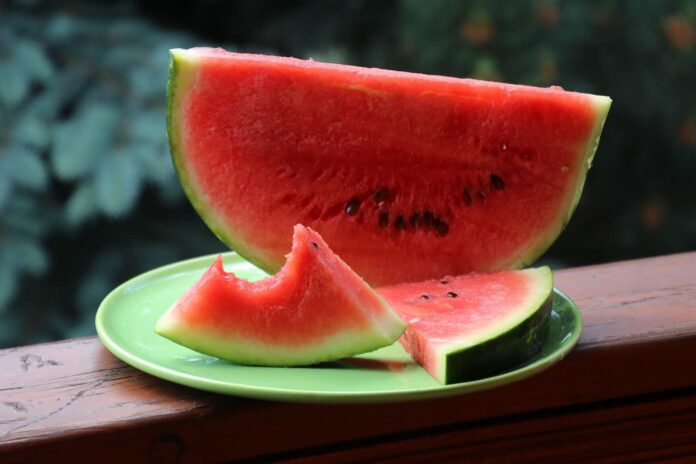Eating watermelon is a delicious and nutritious method to stay hydrated also enjoying a sweet snack that will help you stay cool in a hot summer. Watermelon is low in calories and sugar but high in vitamins, minerals, and antioxidants, making it an excellent complement to any balanced diet.
Watermelon Nutrition Facts
One cup of watermelon (152 g) contains: (1)
- Calories: 45.6
- Fat: 0.2g
- Cholesterol: 0mg
- Sodium: 1.52mg
- Carbohydrate: 11.5g
- Fiber: 0.6g
- Vitamin C: 12.3mg
- Potassium: 170mg
- Calcium: 10mg
- Vitamin A: 865 IU
- Lycopene: 6,890 micrograms
Helps You Stay Hydrated
Drinking water is an important way to keep your body hydrated. However, eating foods that have a high water content can also help. Interestingly, watermelon is 92% water (2).
What’s more, a high water content is one of the reasons why fruits and vegetables help you feel full. The combination of water and fiber means you’re eating a good volume of food without a lot of calories.
May Help Prevent Cancer
Lycopene is a type of carotenoid that doesn’t change into vitamin A (3). This potent antioxidant gives a red color to plant foods such as tomatoes and watermelon and is linked to many health benefits.
Watermelon has a higher lycopene concentration (4868 μg/100 g) than raw tomatoes (3025 μg/100 g) (21), ranking 5th among major lycopene contributors in the US diet (4).
Though lycopene intake is associated with a lower risk of some types of cancer, study results are mixed. The strongest association so far appears to be between lycopene and prostate and colorectal cancer. (5, 6).
It appears to reduce cancer risk by lowering insulin-like growth factor (IGF), a protein involved in cell division. High IGF levels are linked to cancer (7, 8).
Watermelon, as well as other fruits and vegetables, has lycopene, a naturally occurring antioxidant. The substance is also responsible for the red color of watermelon. Studies have highlighted that increasing your lycopene intake may reduce your risk for cancers.
May Improve Heart Health
According to WHO, heart disease is the number one cause of death worldwide (9). Study shows that consuming foods with lycopene may reduce your risk for heart disease and stroke (10).
Consuming watermelon also provide citrulline, an amino acid that may boost nitric oxide levels in your body and help your blood vessels expand, lowering blood pressure (11).
Other vitamins and minerals in watermelon include magnesium, potassium, and vitamins A, B6, and C, all of which are beneficial to your heart and overall health. Watermelon has several heart-healthy components, including lycopene, citrulline and other vitamins and minerals.
May Reduce Inflammation
Watermelon contains a special combination of antioxidants, including lycopene and vitamin C, which help reduce inflammation and oxidative damage over time (10).
Those suffering from inflammation may experience swelling, pain, or flushed skin.
Chronic inflammation can also cause major illnesses like cancer, asthma, heart disease, and type 2 diabetes.
According to an animal study, rats fed watermelon powder to replace an unhealthy diet generated less oxidative stress and lower levels of the inflammatory marker C-reactive protein than the control group (12).
Furthermore, in an 8-week research, 31 adults with obesity and high inflammatory markers received 500 mg of vitamin C twice daily. They had a significant drop in inflammatory markers compared to the control group (13).
Watermelons include anti-inflammatory antioxidants such as lycopene and vitamin C. Inflammation is associated to numerous chronic disorders. Include watermelons in your diet to get the most from it.
It’s Beneficial for Your Skin
Watermelon contains water and vitamins A, B6, and C, which help keep your skin soft and smooth. Vitamin C enhances collagen production, increasing skin elasticity, blood flow and restore skin cells (14).
Vitamin A is also beneficial to healthy skin since it aids in the creation and repair of skin cells (14).
Several nutrients in watermelon are good for your hair and skin. Some help keep skin supple while others protect against sunburn.
Adds in Digestion
Watermelon has a high water content and a little quantity of fiber, both of which are essential for proper digestion. Fiber bulks up your stool and keeps it regular, whilst water aids in the movement of waste through your digestive system (15, 16).
Some health professionals believe watermelon may help treat ulcerative colitis (17). Although further research is needed.
May Add in Weight Management
Choosing watermelon over another sweet snack will help you stay full for longer. Limited research published in 2019 discovered that people who were heavy ate watermelon instead of low-fat cookies had better satiety (18).
Eating watermelon on a daily basis was linked to lower body weight, BMI, blood pressure, and waist circumference (18).
Watermelon Seeds and Rind
Most people like to eat fresh watermelon with its red or pink flesh. But you may also consume the rind and seeds, which have their own set of health benefits.
Rinds have less sugar and more fiber than the flesh of a watermelon. When consumed with the remainder of the melon, it may slows sugar absorption in the gut. Watermelon rinds also include L-citrulline, which may lower blood pressure and improve athletic performance.
Conclusion
Watermelon is a surprisingly healthy fruit. It has a high water content and also delivers many other important nutrients, including lycopene and vitamin C.
These nutrients mean that watermelon isn’t only a tasty low-calorie treat — it’s also very good for your health. Studies suggest that this sweet, red melon may even boost heart health, skin health, weight loss and decrease inflammation, though more research is needed.

